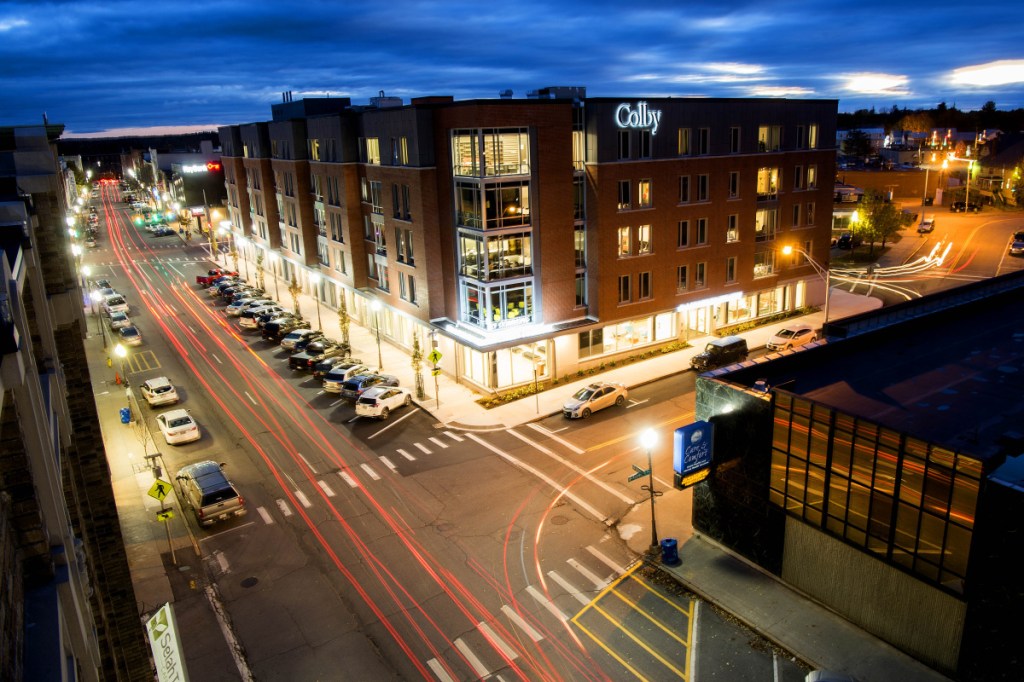If you search for “Waterville” in a national news database, you’ll likely find a story about Maine’s outgoing governor, who served eight years as mayor before moving the to Blaine House. After that, there might be a story about the current mayor — his provocative social media posts, and his many feuds with the City Council.
Yet this, too, shall pass. A closer-grained look at Waterville discloses a city that — rare in Maine, or anywhere else — is actively seeking a new identity, and finding one.
When you walk down Main Street today, it can be disorienting for those how haven’t been there in awhile. The big gap on the west side of the street — deliberately created by urban renewal five decades ago — has been filled in by a brand-new building, owned by Colby College.
In a couple of years, traffic will be dramatically rerouted, thanks to a $7.4 million federal grant that recognizes the city’s and the college’s commitment to renewing and transforming the downtown, and making it — once again — the heart of the city.
By restoring two-way traffic both on Main Street and the parallel Front Street, traffic southbound on College Avenue (Route 201) will be diverted from Main Street, allow it to serve only those people whose destination is downtown — what planners call “traffic calming.”
To its detractors — and there are some — the college is trying to turn Waterville into “Colbyville.” What’s really happening is that the college, which moved from downtown to Mayflower Hill starting in 1938, is reconnecting with the community that has nurtured it for more than two centuries.
Is a good thing or a bad thing to have college employees on the City Council? Is it a good thing or a bad thing for college students to be living downtown, and actively engaging in the community?
If you say it’s a bad thing, then you must consider what that might mean, long term. Are there new mills on the horizon to stimulate new jobs? Is it even possible to imagine a return to the 1950s and ’60s, the last time the city thrived without the active involvement of its largest employer?
And if it comes to industry, Waterville is doing better than most. The Finnish company Huhtamaki has proven to be a good owner for the packaging plant once known as Keyes Fibre, and has maintained skilled jobs in a highly competitive environment.
The old Maine Central Railroad locomotive and car shop, almost left for dead after the collapse of much of the state’s freight rail system, is again adding employees, thanks in part to Pan Am Railways’ contract work for other railroads and transit authorities.
It’s true that Main Street is still being redeveloped, and what it will look like a decade from now is still uncertain. A new hotel, to be built at the south end of Main Street — the city once had three downtown — will put Waterville back on the map for a new range of business and commerce.
And, with a solid base in the new arts center, the Opera House (and city hall) plus the college’s commitment, it seems a safe bet Waterville will become not only the hub of northern Kennebec County, but an attraction to visitors from all over.
I used to visit Railroad Square Cinema for its funky movies that weren’t shown anywhere else. A generation later, it hosts the Maine International Film Festival, and will become an anchor tenant of the new downtown arts district.
The phrase “human capital” is mostly used by personnel departments, but it’s ultimately the key to how communities work — or, if they’re not working, how they can be reinvented.
Waterville’s declining population and tax base from the 1990s onward was a danger sign cities ignore at their peril. This city, to its credit, got to work, evaluated its assets, and has devised what might be termed a de facto long-range plan.
Understanding what citizens want — as opposed to customers, more easily defined — is challenging, and often contentious. In the end, though, getting people back at the center of things, as Waterville is doing, is the ultimate gauge of success.
Growing pains are inescapable. People fear the loss of what they’ve known because they can’t envision their own part in the future — at least not yet.
There will always be much to criticize as city government goes about its appointed tasks; that’s part of the process, too. Perhaps a moment’s reflection at year’s end, however, would be useful for one and all.
Douglas Rooks has been a Maine editor, opinion writer and author for 34 years. He is the author of “Rise, Decline and Renewal: The Democratic Party in Maine,” and welcomes comment at: drooks@tds.net
Send questions/comments to the editors.



Success. Please wait for the page to reload. If the page does not reload within 5 seconds, please refresh the page.
Enter your email and password to access comments.
Hi, to comment on stories you must . This profile is in addition to your subscription and website login.
Already have a commenting profile? .
Invalid username/password.
Please check your email to confirm and complete your registration.
Only subscribers are eligible to post comments. Please subscribe or login first for digital access. Here’s why.
Use the form below to reset your password. When you've submitted your account email, we will send an email with a reset code.